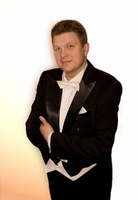Giedrius Prunskus (baritone) was born in Šiauliai on October 10, 1971. In 1978–1989 he attended the Second Secondary School in Jurbarkas. In 1985 he graduated from Jurbarkas Children Music School, the class of violin. In 1989–1991 he studied at the Lithuanian Agricultural University.
From 1992 he started studying singing at Kaunas Juozas Gruodis Conservatoire. His teacher was Regina Kabalinienė for one year and later – the Associated Professor Gediminas Šmitas. Prunskus graduated from the Conservatoire in 1995.
He continued his singing studies at the Lithuanian Academy of Music and Theatre, Kaunas Faculty, in the class of the Associated Professor G. Šmitas. In 2000 he received his Bachelor’s degree. In 2001–2002 Prunskus studied at Felix Mendelssohn–Bartholdy College for Music and Theatre, Leipzig, Germany, under Prof. Jitka Kovařikova–Richter’s supervision. He continued his studies at the Lithuanian Academy of Music and Theatre, Kaunas Faculty, where he was awarded the Master’s degree in 2003.
In 2003–2005 Prunskus attended training classes at the Lithuanian National Opera and Ballet Theatre. Simultaneously, he was studying for art licenciate at the Lithuanian Academy of Music and Theatre (singing teacher – Prof. Virgilijus Noreika); upon finishing his studies he was awarded the art licenciate qualification. From 2003 he was working as an assistant at the Lithuanian Academy of Music and Theatre, Kaunas Faculty, Singing Department. From 2006 he is a lector of the Singing Department. In 2003, Prunskus joined the Lithuanian Musicians’ Union.
In 2001, at Stasys Baras Singers’ Competition, Vilnius, he won the first prize in the baritone category. In 1998–2001 Prunskus won V. Baltrušaitis grant, which is usually awarded to the best baritone studying at the LAMT KF by way of competition. In 2004 he received the stipend of LNOBT.
G. Prunskus is invited to LNOBT and Kaunas State Musical Theatre to sing various baritone parts. In 2000 he debuted at Kaunas State Musical Theatre with his part of Baron Douphal in G. Verdi’s “La Traviata”, and in 2004, at the Lithuanian National Opera and Ballet Theatre where he performed Kromov’s part in F. Lehar’s operetta “The Merry Widow”. The soloist has been cooperating with Kaunas Philharmonic, Kaunas State Choir and various orchestras and choirs of the country.
As a soloist, he often gives concerts both in the country and abroad: Italy, Czech Republic, Germany, Poland, Switzerland, Norway, and Estonia. In addition to his opera repertoire, the singer also performs Lied genre music, oratories and religious music, organises theme concerts. He has organised many solo concerts in various halls of Vilnius, Kaunas, Klaipėda and other towns.
|
|
|
|
|
|
Prepared parts of stage works:
Operas:
- V.Klova “Pilėnai” – Pilėnietis (not performed on the stage)
- G.Bizet “Carmen” – Dancairo (not performed on the stage)
- Ch.Gounod “Romeo et Juliette” – Mercutio (not performed on the stage)
- Musorgskij “Boris Godunov” – Pristav (not performed on the stage)
- W.A.Mozart “Le Nozze di Figaro” – Figaro (LMTA, 1997)
- W.A.Mozart “Le Nozze di Figaro” – Almaviva (LMTA, 1998)
- Ch.W.Gluck “Die Pilger von Mekka” – Vertigo (LMTA, 1999)
- G.Verdi “La Traviata” – Douphol (KSMT, 2000)
- G.Verdi “La Traviata” – Germont (KSMT, 2001)
- U.Giordano “Andrea Chenier” – Rouche (KSMT, 2001)
- Ch.Gounod “Faust” - Valentin (KSMT, 2002)
- Ch.Gounod “Romeo et Juliette” - Capulet (KSMT, 2003)
- F.von Flotow “Martha” – Plumkett (KSMT, 2003)
- G.Rossini “Il Barbiere di Siviglia” – Figaro (LNOBT, 2004)
- B.Dvarionas “Dalia” – Radvila (LNOBT, 2004)
- J.Kačinskas “Black Ship” – captain (Kaunas Philharmonic, 2007)
- Petrauskas “Birutė” – Old Priest (12th Pažaislis Music Festival, 2007)
- G.Donizetti “L‘Elisir d‘Amore” - Belcore (LMTA-KSMT, 2008)
Operettas:
- F.Lehar “Die lustige Witwe” - Kromov (LNOBT, 2004)
Musicals:
- Z.Bružaitė “Mermaid” – Fisherman (KTU-KSMT, 2001)
- Z.Bružaitė “Mermaid” – Rivulet (KTU-KSMT, 2001; events of Kaunas Days, 2007)
- C.Porter “Kiss me, Kate” – Harison Houvel (KSMT, 2008)
- R.Rodgers “The sound of Music” – Admiral von Schreiber (KSMT, 2008)
Solo parts of oratories, Masses, cantatas (bass or baritone):
- V.Bartulis, oratory “Mozart’s Birthday”
- Č.Sasnauskas, requiem Mass “Requiem”
- J.S.Bach, cantata “Ich habe genug” (I’ve Had Enough)
- J.S.Bach, cantata “Nach dir, Herr, verlanget mich” (I Long for you, my Lord)
- D.Buxtehude, cantata “Jesu, meine Freude” (Jesus, my Joy)
- Th.Dubois, oratory “Les sept paroles du Christ” (Seven words of Christ)
- Ch.Gounod, Mass “Messe Solennelle” (Solemn Mass)
- J.Haydn, oratory “Die Jahreszeiten” (Times of the Year)
- J.Haydn, requiem Mass “Requiem”
- J.Kircher, Mass “St.Martinus-Messe”
- W.A.Mozart, Mass ”Missa brevis G major”
- W.A.Mozart, requiem Mass “Requiem”
- S.Parker, project of the new opera “Myth Conceptually: Stories of George”
- S.Rachmaninov, cantata “Vesna” (Spring)
- A.H.Rosewig, Mass “Missa Es mjor”
- C.Saint-Saëns, oratory “Oratorio du Noël” (Christmas Oratory)
- E.Selvik, oratory “Abraham”
- D.Shostakovich, opera-farce “Antiformalisticheskij rayok” (Anti-formalistic Hotchpotch)
Vocal cycles:
- F.Bajoras “Carnival”
- F.Bajoras “Winter – White Fir-tree”
- V.Barkauskas ”Three Satyric Pictures”
- J.Bašinskas “Three Puzzles"
- V.Bičiūnas “Poet’s Love”
- Z.Bružaitė “Triolets”
- A.Kubiliūnas “Merry and Sad Songs”
- G.Kuprevičius “To Breathe”
- G.Kuprevičius “Three Days and One More”
- A.Shenderov “A Cow Ate Hay”
- J.Brahms “Magelone”
- B.Britten “Seven Sonnets of Michelangelo”
- P.Cornelius “Vater Unser” (Our Father)
- J.Ibert “Trois chansons du Don Quichotte” (Three Songs of Don Quixote)
- G.Mahler “Lieder eines fahrenden Gesellen” (Songs of a Travelling Apprentice)
- Musorgskij “Detskaja” (Room of Children)
- Ravel “Don Quichotte à Dulcinée” (Don Quixote – for Dulcinee)
- C.Reinecke “Vier Duette” (Four Duets)
- N.Rota “Tre liriche infantili” (Three Childish Poems)
- F.Schubert “Die schöne Müllerin” (Beautiful Miller)
- F.Schubert “Schwanengesang” (Swan Song)
- F.Schubert “Winterreise” (Winter Road)
- R.Schumann “Vier Husarenlieder” (Four Songs of Husars)
- A.Schoenberg “Brettl-lieder” (Cabaret Songs)
- D.Shostakovich “Chetyre stihotvorenija kapitana Lebjadkina” (Four Poems of Captain Lebiadkin)
- D.Shostakovich “Satiry” (Satires)
- D.Shostakovich “Sjuita na slova Mikelangelo Buonarroti” (Michelangelo’s Suite)
- V.Ullmann “Liederbuch des Hafis” (Hafis’ Songs)
- H.Wolf "Michelangelo-lieder” (Michelangelo’s Songs)
Concert programmes:
- Programme of sacral music “Pieta, Signore” (2003)
- Programme of vocal music of Austrian and German composers “From Bach to...” (2004)
- Programme of vocal music of Lithuanian composers “The Country Where I Grew up” (2005)
- Programme according to the vocal cycle of J.Brahms “Magelone” and fairy-tale by L.Tieck “Love Story of Count Peter and the Beautiful Magelone” (2005)
- Programme of vocal music “With Hope and Some Satire” (2005)
- Programme of music from operettas “With Love” (2005)
- Programme of W.A.Mozart’s vocal music pieces “Myth of Mozart and Salieri“ (2006)
- Programme of German baroque music “Noble Music” (2006)
- Programme of Russian and Lithuanian composers’ vocal music “Satire in Music” (2006)
- Programme of Advent music “When it Snows” (2006)
- Programme of music of Lithuanian composers “Between Vilnius and Kaunas” (2007)
- Evening of music and philosophy “Nostalgia for Perfection and Two Great European plots: Don Quixote and Don Juan” (2007)
- Theatrical event, opera-farce by D.Shostakovich “Anti-formalistic Hotchpotch” (2007)
- Educational project “120 Years to S.Šimkus” (2007)
- Programme of men's quartet Opus Vocalis “Bringing Christmas to the World” (2007)
- Programme of P.Tchaikovski vocal music (2008)
- Evening of music and philosophy “Meeting of Music and Poetry in the Territory of the Sculpture Genius: Michelangelo’s Sonnets in Music” (2008)
- Evening of Lied genre “Under David’s Star” (2008)
- Programme of men's quartet Opus Vocalis “Programme of K.Čiurlionis’ Music” (2008)
Other works:
Wide repertoire of Lied genre in which the works of composers of German Classicism and Romanticism dominate.
Abundant repertoire of songs and arias created by Lithuanian composers, works of emigrants’ representatives make a large part of it.
Various arias, scenes, ensembles from operas, operettas, musicals, oratories and cantatas written by composers of various epochs.
Italian (Neapolitan) songs, romances and songs of Russian composers, etc.














